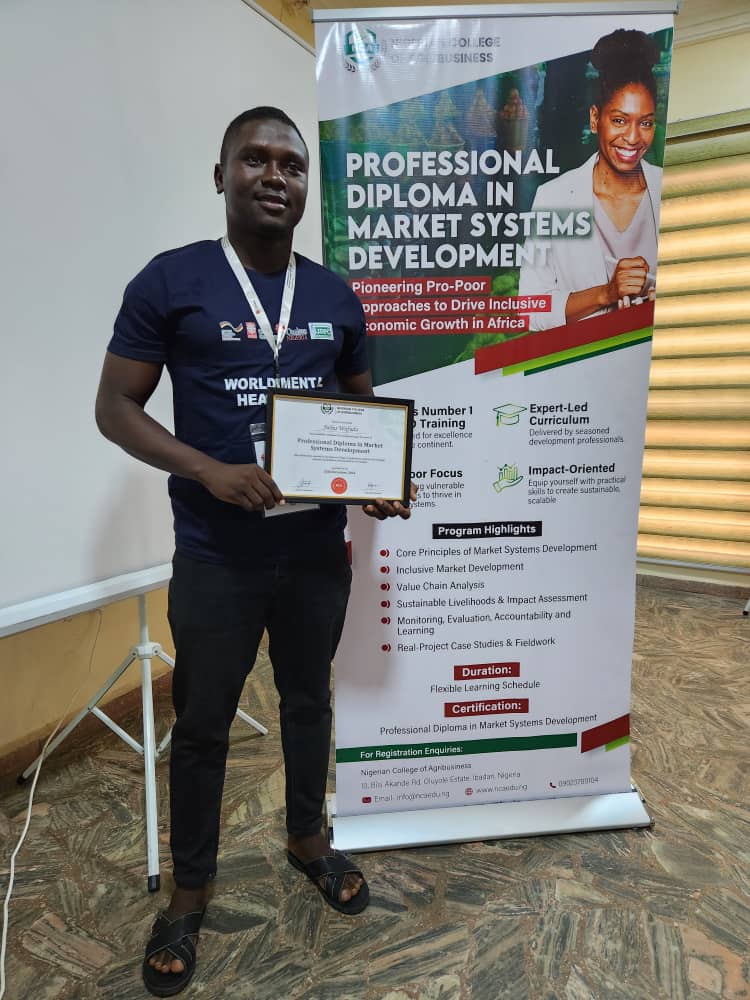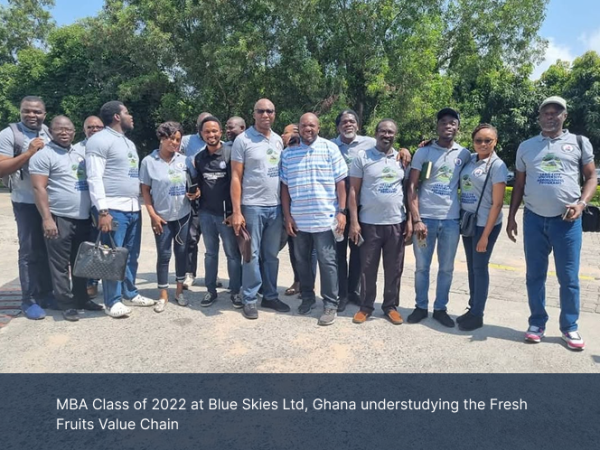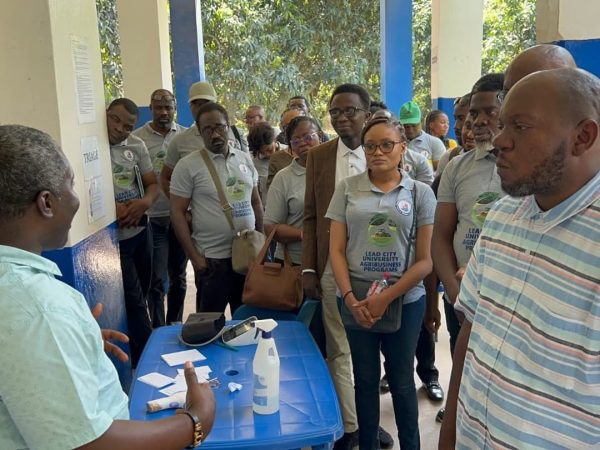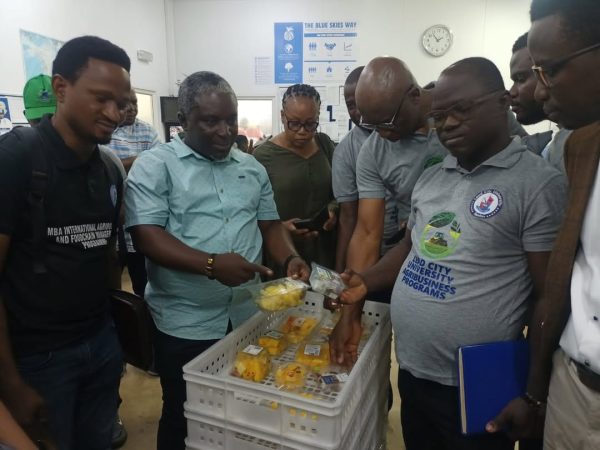
…..Africa’s leading Postgraduate Qualification for Agrifood Professionals
Starting Date: November 1, 2025

The MBA in Development Management is Africa’s first executive-level program that positions development as both a business and an engine of innovation. It goes beyond teaching how to manage projects as it equips professionals to redesign systems, mobilize capital for impact, and steer organizations through the complex interplay of policy, markets, and communities. Rooted in Africa’s realities yet globally oriented, this MBA produces professionals who can align donor priorities with local aspirations and transform development challenges into opportunities for sustainable growth.
The development sector today is not what it was a decade ago. Traditional aid models are giving way to approaches shaped by private investment, digital transformation, and new demands for accountability. The focus has shifted from counting activities to proving long term impact while global disruptions such as climate change, food insecurity, migration, and fragile governance are reshaping priorities across Africa and beyond. In this environment, development management calls for professionals who can think strategically, innovate boldly, and act with both business intelligence and social purpose.
This program is designed to meet that call. It combines the discipline of business administration with the dynamism of development practice, introducing professionals to emerging tools such as blended finance, systems thinking, adaptive management, and social impact measurement. More than an academic credential, the MBA in Development Management is a transformational journey that empowers professionals to move from managing projects to shaping systems, from responding to donor agendas to driving homegrown solutions, and from delivering short term outputs to building enduring legacies of change.

Our program covers a wide spectrum of food products, ensuring that students are well-versed in the processing and post-harvest management of fruits, vegetables, grains, meats, dairy, seafood, and other commodities. This comprehensive approach equips graduates to excel in various sectors of the food industry.
A dedicated module on food quality control, standards, and certifications equips students with the expertise to maintain and ensure the highest standards of food quality and safety. Graduates will understand the importance of adhering to regulatory standards and certifications in the food industry.
Graduates will be well-prepared to identify market trends, assess consumer preferences, and make informed decisions to maximize economic returns in the food processing and post-harvest sector.
This module provides the intellectual foundation for the program. It explores the evolution of development thought, from aid-driven approaches to sustainability, resilience, and systemic transformation. It integrates economics, policy, and leadership, giving professionals the tools to analyze development challenges and design strategies that are adaptive, inclusive, and impact-driven.
This module applies strategy frameworks to the realities of development organizations. It covers mission alignment, stakeholder analysis, competitive positioning, and strategic planning in contexts of uncertainty. Emphasis is placed on how NGOs, donor agencies, and social enterprises balance short-term program goals with long-term sustainability and systemic transformation.
This module introduces the Market Systems Development (MSD) approach and the Making Markets Work for the Poor (M4P) framework. It emphasizes systemic facilitation rather than direct delivery, equipping professionals with the tools to diagnose market constraints, design facilitative interventions, and measure systemic change. Case studies from agriculture, finance, health, and SME development illustrate how MSD fosters inclusive growth.
This module equips professionals to manage complexity in dynamic development environments. It introduces systems thinking as a tool for mapping interconnected challenges and adaptive management as a framework for designing flexible, iterative programs. Through real-world cases, participants learn how to navigate uncertainty, integrate feedback loops, and build resilience into development interventions.
This module goes beyond traditional monitoring and evaluation to explore advanced impact measurement frameworks. It covers logical frameworks, theory of change, results-based management, and social return on investment (SROI). Participants learn how to design systems that capture not only outputs and outcomes but also systemic and long-term development impact.
This module explores HRM functions in the unique context of development organizations. It covers talent acquisition, performance management, training and capacity building, motivation in mission-driven environments, and managing multicultural teams. Attention is given to HR challenges in donor-funded projects, volunteer management, and maintaining ethical workplace practices.
This module examines how digital technologies are reshaping development delivery and accountability. It explores mobile platforms, data analytics, blockchain, AI, and digital finance as tools for expanding reach and improving transparency. Participants learn how to integrate digital tools into project design and implementation while managing risks related to data privacy, access, and inclusion.
This module blends classical project management methodologies with the realities of development programming. It covers project cycles, donor reporting requirements, stakeholder engagement, risk management, and adaptive programming. The focus is on building the capacity to design, implement, and evaluate complex, multi-stakeholder projects in line with international standards.
This module adapts MBA-level finance to the development sector. It covers budgeting, financial reporting, cost management, audits, and donor compliance. In addition, it introduces innovative financing models such as blended finance, impact investing, and crowdfunding, equipping professionals to mobilize and manage resources for sustainability and accountability.
The international study tour is a signature component of this MBA, immersing participants in the realities of development practice across Africa. For one intensive week in a selected African country, students will engage directly with development agencies, government institutions, social enterprises, and donor funded projects, gaining exposure to how development strategies are designed, financed, and implemented on the ground.
Participants will explore inclusive growth initiatives, examine the application of market systems approaches, and learn how impact is measured in alignment with Africa’s evolving development priorities. The tour will include high-level engagements with policymakers, program directors, and social innovators, providing practical insight into how development agendas and challenges are being translated into opportunities for systemic change and scaled for wider transformation.
This experience broadens participants’ perspectives on the dynamics of development across borders, strengthens their ability to connect knowledge with practice, and equips them with the skills to lead development organizations with strategic clarity, innovation, and accountability. The tour serves as a transformational journey that positions graduates as development professionals capable of shaping policy, managing programs, and delivering impact at scale.



The Final Award on this program is Master of Business Administration (MBA) in Development Management of Lead City University, Ibadan.
Candidates seeking admission into the MBA in Development Management must hold a BSc or HND from a recognized institution, with a minimum of Second-Class Lower Division or its equivalent.
The program is designed for motivated professionals with strong academic or industry backgrounds, demonstrated creativity, and the ability to think critically in solving complex development challenges.
Admissions into the MBA in Development Management are open for the September and March cohorts each year.
All applicants undergo a screening and selection process. Due to limited class sizes and high application volume, early application is strongly recommended to secure a place in the upcoming cohort.
Application Fee: ₦25,000.
Tuition Fee: ₦N1.4m
Blended
Get monthly marketing tips and exclusive discounts straight to your inbox

Our mission is to cultivate a vibrant, sustainable and profitable agribusiness sector that drives economic growth and social progress across Africa and beyond.
We are committed towards educating a new generation of agribusiness sector leaders that will transform the economic fortunes of the African continent
© NCAEDU 2023 All Rights Reserved.